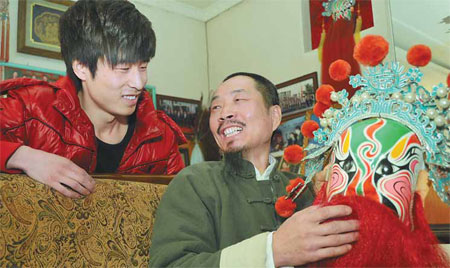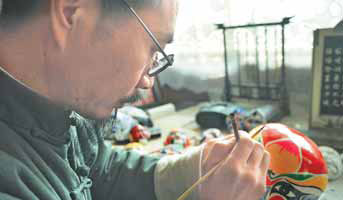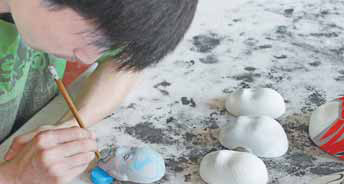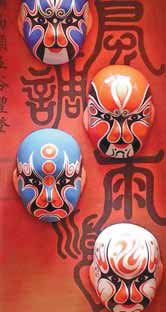Fresh-faced art
Updated: 2013-06-03 08:11
By Zheng Jinran (China Daily)
|
||||||||
|
Jiao Yingming and his son Jiao Xuefeng have carried on the family's connection with Peking Opera in their prosperous mask-making business. Yang Shiyao / Xinhua |
|
The painting - primarily white, red and black - usually takes about two days. Yang Shiyao / Xinhua |
|
Jiao Xuefeng is not only a master craftsman but also adept at promoting the craft on the Internet. Pei Pei / China Daily |
|
Jiao's workshop produces more than 500,000 masks a year. Yang Shiyao / Xinhua |
A mask maker brings an ancient craft into the contemporary market, Zheng Jinran reports in Gu'an, Hebei province.
It's a traditional Chinese art, but the facial makeup of Peking Opera is finding a modern renaissance with the magical touch of Jiao Yingming.
His small workshop produces more than 500,000 Peking Opera masks every year. These reproductions of facial makeup are crafted from different materials, such as paper and crystal stones. At least 60 percent are sold abroad to about 30 countries, including the United States, Britain, France, Australia and South Korea.
"We usually get orders for thousands of masks six months ahead of Christmas," says the 49-year-old man from Gu'an county of Langfang, Hebei province.
His workshop has recruited about 40 people to meet the flood of orders every year. In 2012, the net income from his business reached 1.5 million yuan ($244,500).
To appeal to foreigners and young people in China, he has made innovations in the designs and the use of materials.
The facial makeup used in Peking Opera stemmed from performances that can be traced back 1,400 years. Different colors of makeup, as well as the various facial expressions, represent different characters, personalities and fates of the roles.
Traditionally, Peking Opera masks are made of plaster, and it usually takes three years before they are dry and hard enough to paint like makeup.
The painting takes two days, starting with the base color (usually white), then outlining sections before filling them with colors (mainly red and black). Finally, the "makeup" is covered with a special latex coating to protect the bright color for a long time.
"It's time-consuming," Jiao says. "It's not efficient to produce a large amount of products in months," adds the man who had his first products sold in the US in 1987.
Jiao started to make the masks on paper or resin. In addition to the traditional form of masks, he created other products from paper for hanging, incorporating crystal stones for decoration and small light ornaments for Christmas trees.
His mask business has become an industry, including crafting and packing the products, bringing thousands of jobs for residents in neighboring counties.
Jiao is the sixth generation since his ancestors became devoted to Peking Opera around 200 years ago. He was influenced in his boyhood by many of his family members who performed this national opera, and later decided to carry on the family's tradition.
He quit a stable job in his hometown in his 20s and went to Beijing to further his study of painting. By accident, he got a chance to make masks for a US company in 1987, realizing it was a new way to combine his painting and Peking Opera.
"At first I wanted to make a living on my family tradition and also spread this old art to more young people" he says. "Now my focus is to preserve this splendid culture with books and exquisite facial masks."
He usually spends about 17 hours a day to paint, read and play guqin, a seven-stringed plucked music instrument.
It took him more than four years to document more than 800 characters' facial makeups in Peking Opera plays, which he hopes to publish as a book someday.
"Young people in our county would like to learn this old skill either because of pure interest or the desire to make money," he says.
"But to make more young people and even foreigners know this traditional art, the country needs to give more help to the people inheriting and spreading the traditions."
Contact the writer at zhengjinran@chinadaily.com.cn.
Pei Pei contributed to the story.
(China Daily USA 06/03/2013 page10)

 Michelle lays roses at site along Berlin Wall
Michelle lays roses at site along Berlin Wall
 Historic space lecture in Tiangong-1 commences
Historic space lecture in Tiangong-1 commences
 'Sopranos' Star James Gandolfini dead at 51
'Sopranos' Star James Gandolfini dead at 51
 UN: Number of refugees hits 18-year high
UN: Number of refugees hits 18-year high
 Slide: Jet exercises from aircraft carrier
Slide: Jet exercises from aircraft carrier
 Talks establish fishery hotline
Talks establish fishery hotline
 Foreign buyers eye Chinese drones
Foreign buyers eye Chinese drones
 UN chief hails China's peacekeepers
UN chief hails China's peacekeepers
Most Viewed
Editor's Picks

|

|

|

|

|

|
Today's Top News
Shenzhou X astronaut gives lecture today
US told to reassess duties on Chinese paper
Chinese seek greater share of satellite market
Russia rejects Obama's nuke cut proposal
US immigration bill sees Senate breakthrough
Brazilian cities revoke fare hikes
Moody's warns on China's local govt debt
Air quality in major cities drops in May
US Weekly

|

|











